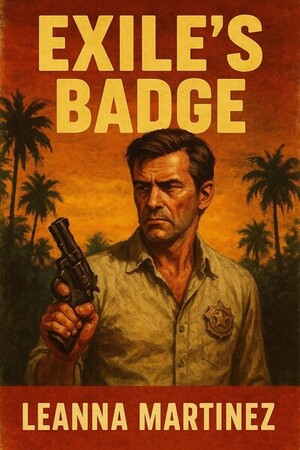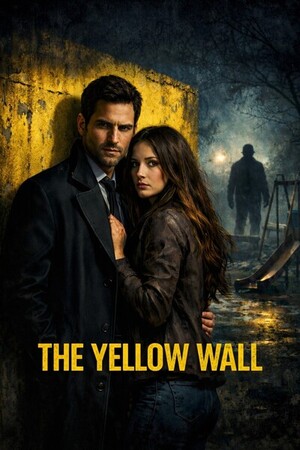Chapter 3:
The Wrong Kind of Friends
Exile's Badge
Sam sat at his desk with the blinds half-drawn against the gray San Francisco light. A stack of manila folders fanned out across the surface, pages marked with his tight handwriting. Coffee had gone cold in a paper cup at his elbow, but he barely noticed.
Vincent Caruso’s name was threaded through everything. Sam traced it from property records to campaign finance reports, each breadcrumb leading him deeper into the web. Caruso never appeared on the paperwork himself, but the shell companies all had the same fingerprints: addresses in the Tenderloin, empty offices registered to cousins, cousins of cousins, men who’d never worked a day in their lives but somehow bankrolled half the city’s development projects.
One in particular leapt out: a sudden surge of donations to Councilman Vincent Vickers. Fifty thousand dollars from a “neighborhood trust” that, on paper, existed to “support youth athletics.”
Sam leaned back, studying the numbers. Last night he had watched an envelope change hands in the fog at Hunters Point. Today, here it was dressed up in a blazer and tie, smiling at a ribbon-cutting.
He pulled another file of press clippings from the Chronicle. Caruso photographed beside a parish priest, presenting a check to restore a church roof. Another, shaking hands with a gym owner, standing in front of kids with gloves too big for their hands. The smile was always the same: calm, practiced, full of the confidence of a man who knew the city needed him more than he needed it.
A chair scraped beside him. Ray Delgado leaned over, squinting at the mess of paper. He tapped one clipping with a stubby finger. “Guy pays for a church roof and you think that makes him Al Capone?”
Sam didn’t look up. “Guy pays for a church roof with money he got from shaking down half the Mission. That makes him smart, not clean.”
Ray grunted, lowering himself into the chair with the sigh of a man already tired of the conversation. “Sam, you’re not building a case. You’re building a scrapbook. Photos, rumors, shaky connections. You take this to the brass, they’ll laugh you out of the room.”
Sam flipped a page, pen scratching in the margin.
Ray leaned closer, lowering his voice. “Listen. Caruso’s not just another street boss. He’s got insulation. Friends in City Hall. Maybe higher. Guys who’ll go down with him if you ever get that far. You push this, you’re not gonna bring him down, you’re gonna light yourself on fire.”
Sam set his pen down, finally meeting his partner’s eyes. There was no heat in his voice, only patience, the same steadiness he gave to his daughter’s questions over breakfast. “Then we see how much smoke they can stand.”
Ray sat back, exhaling smoke from the cigarette he wasn’t supposed to be lighting indoors. “You’re a stubborn bastard, Holden.”
Sam gathered the files into a neat stack, tapped them square against the desk. He didn’t answer. But the look in his eyes said enough.
* * *
Sam drove down Mission Street, the city pressing in on both sides. Storefronts with barred windows, neon signs flickering, kids loitering in hoodies too big for their frames. The Tenderloin had its own rhythm, and tonight it hummed with the low thrum of survival.
He parked outside a narrow parish church whose paint was peeling in long strips from the eaves. Inside, the faint smell of incense lingered. Father Donnelly stood near the altar, rolling up his sleeves after an evening service.
When Sam introduced himself, the priest smiled warily, then softened. “You’re here about Vincent,” he said, not needing to ask.
Sam didn’t confirm or deny. He just waited.
Donnelly nodded slowly, as though weighing his words. “He’s not perfect, Detective. None of us are. But when the roof leaked last winter, he paid to fix it. When old Mrs. Ramos needed her surgery, he covered the bills. You know who didn’t? City Hall. They don’t know we exist.”
Sam wrote nothing, said nothing. The priest seemed almost defensive.
“I’m not blind,” Donnelly went on. “I know where his money comes from. But I also know kids who’d be dead in the street if it weren’t for that boxing gym he opened on Turk Street. Maybe that’s not justice, but it’s something.”
Sam thanked him and stepped back into the night.
At the gym, the smell of sweat and liniment hit him before he opened the door. Young boys sparred in the ring, their gloves thudding against each other’s bodies. The owner, a wiry man with cauliflower ears, greeted him like an old friend.
“Caruso?” the man said when Sam steered the talk. “Best thing that ever happened here. Keeps the streets quiet, pays for uniforms, buys gloves when the kids can’t. You should’ve seen this place before he stepped in.”
Everywhere Sam turned, the same refrain: Caruso took care of his people.
Back in his car, Sam sat with the notebook open on his lap. The night pressed close, alive with distant sirens and the hiss of buses crawling down the avenue. He put pen to paper, his handwriting precise.
Caruso doesn’t need to hide. He wears legitimacy like a suit.
Sam closed the book, slid it back into his coat pocket, and stared out at the lights of the city. For the first time, he felt how heavy this fight was going to be.
* * *
The precinct was half-empty when Sam returned, the hum of fluorescent lights echoing off linoleum floors. A cleaning crew pushed their carts past the bullpen, leaving the faint smell of disinfectant behind them.
Sam dropped into his chair, notebook already open, the day’s words tight across the page. Father Donnelly, the gym, the shopkeepers. Each voice had blended into the same refrain: Caruso takes care of us. Caruso keeps the streets clean. Caruso does what the city won’t.
Ray drifted over, a file folder under his arm. He scanned the desk, the clippings spread out like a mosaic of obsession. “You’re still at it.”
Sam didn’t look up.
Ray set the folder down hard. “You can’t touch him. You push too far, it’s not Caruso who’ll bury you, it’s our own. Captain, IA, the suits at City Hall. You’re poking the wrong bear.”
Sam leaned back, folding his arms. His expression stayed calm, voice even. “Then let’s see how hot it gets.”
Ray studied him a moment longer, then shook his head, muttering under his breath as he walked away.
Sam sat in the quiet, pulling a clipping from the pile. A glossy photo of Caruso at a charity dinner, dark suit, arm around Councilman Vickers, smile aimed squarely at the camera. A man who looked like a leader, not a predator.
Sam pinned it to the corkboard above his desk, the tack sinking in with a sharp snap. He sat back, staring at the photo the way a chess player studies an opponent’s first move—silent, calculating, patient.
The game had begun.




Please sign in to leave a comment.